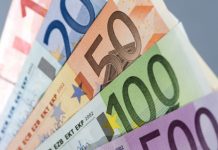The pound continued to appreciate against the euro on Tuesday, after a mixed batch of eurozone economic data. Sterling hit a fresh monthly high versus the common currency, breaking through €1.14, before ending of the session marginally higher at €1.1405 for the pound.
| What do these figures mean? |
|---|
|
When measuring the value of a pair of currencies, one set equals 1 unit and the other shows the current equivalent. As the market moves, the amount will vary from minute to minute. For example, it could be written: 1 GBP = 1.13990 EUR Here, £1 is equivalent to approximately €1.14. This specifically measures the pound’s worth against the euro. If the euro amount increases in this pairing, it’s positive for the pound. Or, if you were looking at it the other way around: 1 EUR = 0.87271 GBP In this example, €1 is equivalent to approximately £0.87. This measures the euro’s worth versus the British pound. If the sterling number gets larger, it’s good news for the euro. |
As hopes continued to rise that the Bank of England (BoE) will raise interest rates, so did the value of the pound. Investors were happy to ignore news that UK consumer sentiment had worsened in October. Investors believed that the data wasn’t serious enough to dampen the chances of an interest rate hike when the central bank monetary policy committee (MPC) meets on Thursday. The market is placing an 88% probability on the rate hike by the central bank. This means that if the UK’s central bank, for any reason, doesn’t raise the interest rates, then sterling could tumble quite heavily.
| Why do raised interest rates boost a currency’s value? |
|---|
| Interest rates are key to understanding exchange rate movements. Those who have large sums of money to invest want the highest return on their investments. Higher interest rate environments tend to offer higher yields. So, if the interest rate or at least the interest rate expectation of a country is relatively higher compared to another, then it attracts more foreign capital investment. Large corporations and investors need local currency to invest. More local currency used then boosts the demand of that currency, pushing the value higher. |
With Thursday’s BoE rate decision hogging the limelight, Brexit headlines have been few and far between. However, comments that the EU leaders are keen to progress with Brexit negotiations also boosted the pound.
Eurozone inflation disappoints
Tuesday was a big day for the euro, with 3 high-impacting economic indicators released, showing mixed results. Firstly, the economic growth in the eurozone beat analyst’s forecast at a solid 0.6% quarter on quarter, ahead of the 0.5% anticipated. Eurozone economic growth has been a big story in 2017 and this momentum has continued in the third quarter. Furthermore, this has happened despite the value of the euro increasing substantially across the quarter, which could have impeded strong growth. Often, a lower value of the currency increases growth as lower exchange rate makes exports cheaper and therefore increases demand for EU goods.
Secondly, adding to the good news, unemployment in the eurozone fell to its lowest level since 2009. Unemployment has dropped to 8.9%, another very encouraging sign for the bloc.
Thirdly, however, the big disappointment came from eurozone inflation figures. Despite solid economic growth the bloc just doesn’t seem able to ignite price growth. Inflation dropped to 1.4%, down from 1.5% in September. Furthermore, core inflation which removes more volatile prices such as energy prices and food, was down to just 0.9%. This is quite some distance from the central bank’s 2% target rate. When inflation moves higher, central banks are more likely to raise interest rates, which then pushes up the currency’s worth.
With inflation so low, the European Central Bank will be comfortable with the conservative approach that they are taking. Investors will be pushing the chances of an interest rate hike into some distant future. As the odds of any interest rate hike happening soon slips further away, the euro dropped in value.
|
This article was initially published on TransferWise.com from the same author. The content at Currency Live is the sole opinion of the authors and in no way reflects the views of TransferWise Inc. |





